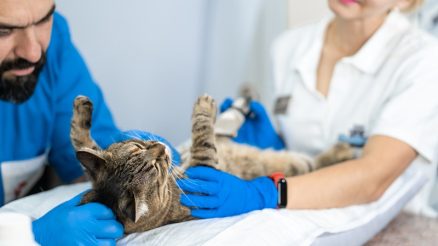Welcome to the world of responsible pet ownership! We love our furry, feathered, and scaled friends and want to ensure they live happy, healthy lives. Part of this commitment involves regular trips to the vet for comprehensive pet check-ups. But what does that entail, you ask? Let me walk you through the essentials of a complete health assessment for your beloved companion that keeps them tail-wagging, purring, or chirping with good vibes.
The Basics of a Pet Health Assessment
Physical Examination
The physical exam is the first step when you bring your pet in for a check-up. This is where the vet gets hands-on, checking your pet from nose to tail. They’re looking for skin, eyes, ears, and mouth abnormalities. Here’s a snapshot of what’s covered:
-
Teeth and gums for signs of dental disease
-
Ears for infection or parasites
-
Eyes for clarity and health
-
Coat for excessive shedding or skin issues
Your vet will also want to listen well to your pet’s heart and lungs, ensuring everything sounds as it should. They may take this opportunity to discuss diet, exercise, and any behavioral concerns you may have.
Weight and Vital Signs
Keeping an eye on your pet’s weight is crucial, as weight gain or loss can indicate underlying health issues. The vet also checks their vitals, including the temperature, heart rate, and respiration rate. They might also assess your pet’s eyesight and hearing to cover all bases.
Necessary Lab Work
We must go beyond the surface to examine your pet’s health. That’s where lab work comes in. Blood tests can spot health issues that aren’t visible on a physical exam. They show how well organs like the kidneys and liver function and reveal the presence of conditions like diabetes, anemia, or infections. A fecal exam is essential, too, to check for parasites like worms, which can be harmful to both pets and humans.
Urinalysis and Other Tests
A urinalysis is a standard part of a pet’s check-up and blood and fecal exams. This test can identify diabetes, urinary tract infections, kidney issues, and more. Sometimes, your vet might recommend additional screenings, depending on age, breed, or if something seems off during the initial exams.
Veterinary Surgery
At times, during a check-up, your vet might find something that warrants further investigation or treatment, possibly leading to pet surgery. For instance, they may detect a suspicious lump needing removal and biopsying or identify a dental issue demanding surgical attention. The idea of our pets undergoing surgery can be daunting, but advancements in veterinary medicine have made procedures safer and recovery times quicker.
The Importance of Vaccinations and Boosters
Keeping your pet’s vaccination schedule up-to-date is like putting a shield around them that protects against various diseases. Your vet will review your pet’s vaccination history and recommend necessary booster shots. Remember, this isn’t just about your pet’s health – some pet illnesses can be transmitted to humans, so vaccinations safeguard the whole family.
Assessing Behavior and Lifestyle
Pets can’t tell us when something’s wrong so behavior changes can be a red flag. Your vet will ask questions about your pet’s habits and behavior, looking for any signs that might indicate a health issue or a need for a change in their daily routine.
Nutritional Counseling
What your pet eats is as essential as the air they breathe. Your vet will discuss nutrition, whether your furry friend is on a commercial, prescription, or homemade diet. They’ll give recommendations tailored to your pet’s age, size, and health status to ensure they get the right balance of nutrients.
The Role of a Comprehensive Veterinary Clinic
Having a reliable vet is like finding a treasure chest for pet parents, and a Spanish Trail vet exemplifies the notion of a comprehensive veterinary clinic. These clinics are one-stop shops for pet health, offering check-ups, lab work, dental care, and sometimes even grooming and boarding. There’s a sense of ease knowing your pet’s health needs can be met under one roof by professionals who understand every aspect of animal care.
Pet Vaccinations and Parasite Prevention
Maintaining your pet’s health involves proactive measures, where pet vaccination and parasite prevention become paramount. Vaccinations are not a one-and-done deal; they require booster shots to remain effective. Similarly, parasite prevention keeps nasty critters like fleas, ticks, and heartworms at bay. Your vet will devise a plan for your pet’s needs and environment.
Final Thoughts
A comprehensive pet check-up is critical to keeping your sidekick in tip-top shape. It’s like detective work, with vets using their skills and tools to spot potential health issues before they become big problems. Regular visits and a loving home environment are the foundations of your pet’s long and healthy life. So keep up with those check-ups – your four-legged friend is counting on you.





